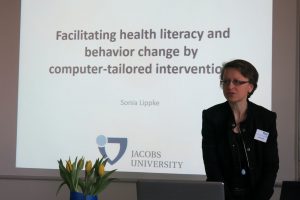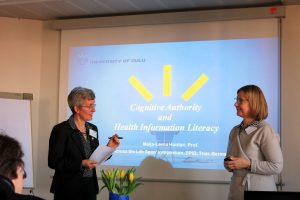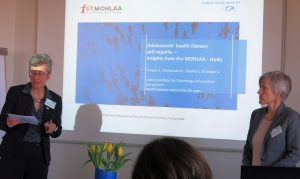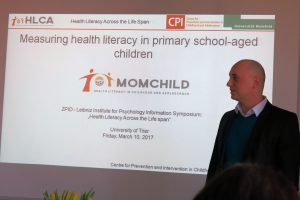Leibniz Institute for Psychology Information, ZPID organized a one day symposium “Health Literacy Across the Life Span” at 10th of March 2017. The day included interesting speakers from Germany and Finland from multiple backgrounds. The symposium was intentionally kept as small-scale and the aim was to sustain discussion and possible future collaboration.
Renate Soellner from University of Hildesmein, Germany told about research project ”Health competence – model building and validation”. They developed, tested and validated a qualitative structural model (so called concept-map) on health literacy. The main questions were: Which skills and abilities build the health literacy construct? How do health competent persons behave? An article has been published on the model (Soellner, Lehartz & Rudinger 2017). Central concepts of the model are self-control and self-regulation.
Sonia Lippke from Jacobs University Bremen, Germany started her talk by telling about the HAPA model (Schwartzer 1992) In this health behaviour change model self-efficacy is one central factor and the goals turn into plans that turn into behavior. Non-intender becomes intender and finally actor. Health literacy can be seen as part of this model. According to Lippke the main deficiency on this model is that is focuses only on one behaviour at time. Therefore she has been involved in developing a new ”lifestyle change model” called Compensatory Carry-Over Action Model (CCAM).
Maija-Leena Huotari from University of Oulu, Oulu, Finland told about the research project conducted at Information Studies in University of Oulu and Åbo Akademi University. She talked about the everyday health information literacy (EHIL) screening tool (Niemelä et al. 2012) and about the new research project, CogAHealth, that is funded by Academy of Finland and has started in Autumn 2016. In this project the concept of cognitive authority is central and Huotari spoke also about it´s connection to EHIL.
Cristiane Firnges from Robert Koch Institute, Berlin, Germany pointed out the need to develop health literacy measures for younger populations, i.e., age-specific assessment tools. She belongs to Health Literacy in Childhood and Adolescence (HLCA) Consortium: https://www.hlca-consortium.de/
Firnges and her colleagues have been developing of MOHLAA-measuring instrument. HLS-EU-Q47 (e.g., Sorensen et al. 2013) measure was used as a blueprint. Not all tems and items contents of the HLS-EU-Q47 were well understood by adolescents or they might have answered them based on hypothetical estimations/lack of experience. There was found to be a need to adapt particular items for adolescents´cognitive abilities and to their lifeworld and experiences. Limited experiences with navigating the health care system and managing diseases was obvious among the teenagers. Critical thinking is still challenge and they might be overly confident about their skills. Adolescents, especially younger ones, have strong trust to their parents.
Orkan Okan from University of Bielefeld, Germany presented the childhood perspective. Measuring health literacy of primary school-aged children (MoMChild study). He started by telling about a systematic literature review on health literacy instruments and what of them have been used for children. Okan and his colleagues has been adapting HLS-EU-Q for this age group and they are now collecting large-scale data among German children.
Anne-Kathrin Mayer Research coordinator of Leibniz Institute for Psychology Information, ZPID told about the health information literacy knowledge test (HILK) they have developed and tested. The test includes 24 items and at the latest stage it has been tested among 144 students. They have also worked on validating the test.
Veronika Kuhberg is a doctoral student at ZPID. Her presentation focused on determinants of health information literacy (HILK) in vocational school students and especially to the role of locus of control and personal beliefs. Especially external health locus of control seems to be an independent factor affecting health information literacy among this population group.
Papers will be written based on the presentations and they will be published later as a book. The day was very fruitful and I thank for Anne-Kathrin Mayer for inviting me to participate!
Heidi




